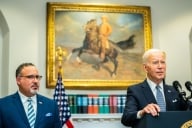You have /5 articles left.
Sign up for a free account or log in.
WASHINGTON -- The higher education agenda that President Obama outlined in his 2010 budget blueprint and a speech this week contained several proposals that, in normal times, might have started a war on Capitol Hill. Just ask his predecessors: Previous proposals to end the lender-based guaranteed student loan program bruised President Clinton; President Bush was repeatedly pummeled for daring to mess with the Perkins Loan Program; and many a president has taken a pounding for seeking to expand federal entitlements, as Obama has done by calling for making Pell Grant funding mandatory and ensuring annual increases tied to inflation.
As the president's chief emissary for those changes, Education Secretary Arne Duncan, made his first Congressional appearance in the job Thursday before the House Budget Committee, lawmakers asked a series of rather polite questions about those and other proposals (plus some K-12 related matters, like charter schools).
But apart from one testy exchange in which Rep. Jeb Hensarling, a Texas Republican, cut off a Duncan answer about Pell Grants to warn that Democratic overspending threatened to overwhelm the country with debt, there was surprisingly little criticism of the president's higher education proposals, even from members of the opposition party.
That doesn't necessarily mean, of course, that the proposals are sure to get through, or that critics aren't lying in wait for Messrs. Obama and Duncan down the road. But it is also possible that a combination of factors is giving the new administration wide berth in pushing ahead with ideas that, under other circumstances, would be generating much more friction. Among them:
- Obama's approval rating stands at 61 percent, which, though down from the initial highs of his first days in office, is still about half again as high as Congress's 39 percent. While Congressional Republicans have shown no reluctance to part ways with the president on major issues and legislation, like the economic stimulus package, they may be disinclined to pick fights with the administration until they need to -- especially at early stages of discussion.
- While the administration's proposals are generally seen as benefiting higher education and students, some of them trouble at least some college officials (for instance, administrators at institutions with large pools of Perkins Loan funds, who fear the proposed revamping of that program will hurt them, and financial aid directors at the many colleges that participate in the guaranteed loan program). Yet while college leaders and lobbyists usually don't hesitate to run to Congressional supporters when things trouble them, many higher education officials -- like the Democratic lawmakers who are often their go-to allies -- are far warier of challenging a mainly friendly Democratic president than they ever were of bashing President Bush.
- The abysmal economic situation is perhaps opening the door wider to ideas that might not fly in other times. The administration is portraying its changes as designed to help make college affordable in difficult economic times, by bringing down the cost of the loan programs (though lenders question the administration's assumptions) and using the savings to ensure that Pell Grant money will be available and to expand low-cost Perkins loans to more colleges and students.
- The student loan lobby, long a powerful force in this town, has been seriously weakened to the point that, at least so far, lenders and their longtime benefactors in Congress are halfheartedly fighting the plan to kill off the Family Federal Education Loan Program. The combination of the student loan scandals of 2007 and the steady erosion of the program's profits by Congress (and the Bush administration) since 2006 have minimized its influence. Although Duncan's assertions that the program is on "life support" infuriated loan industry officials and is probably an exaggeration, there's been relatively little public pushback so far from lenders and their college backers.
On Thursday, the Budget Committee's chairman, Rep. John Spratt (D-S.C.), and Republicans like Rep. Cynthia Lummis of Wyoming both asked Duncan whether the Education Department has the staff and the technological infrastructure to absorb about triple the amount of loan volume that its in-house Direct Loan Program currently handles. (Duncan sought to reassure them, and to make clear that private companies would continue to be involved in the revamped program as contractors who service the loans, under performance-based arrangements.)
There were no major speeches in support of the bank-based program, and in fact the only real hint that a fight might be coming came from a Democratic lawmaker who has a strong history of supporting the direct loan program (but also earned significant campaign support from lenders). Rep. Robert E. Andrews of New Jersey praised Duncan and Obama for their "refreshing" decision not only to propose "lofty ideas" but to recommend ways of paying for them -- in the case of higher education, by ending the guaranteed loan program to pay for Pell Grants.
Andrews told Duncan that he and the president deserved credit for proposing major changes in established programs, which can be "very difficult" in Washington -- "as you're about to experience," he warned, "in this loan debate."









